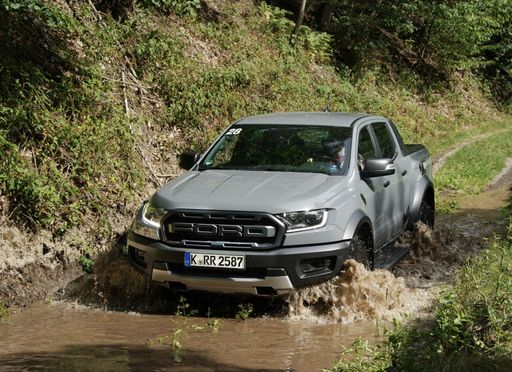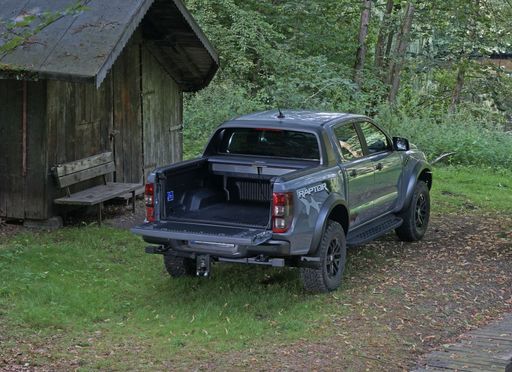Ford Ranger VS Mercedes Sprinter Transporter
Ford Ranger
The Ford Ranger stands out in the pickup market with its robust build and versatile capabilities, making it a popular choice for both work and leisure. Its modern design is complemented by a well-equipped interior, providing comfort and advanced technology. Whether tackling challenging terrains or cruising through the city, the Ranger delivers a reliable and dynamic driving experience.
detailsMercedes Sprinter Transporter
The Mercedes-Benz Sprinter Transporter is renowned for its versatility and reliability, making it a popular choice for businesses across various industries. Featuring a spacious and intelligently designed interior, it offers ample cargo space while ensuring comfort for the driver. With a reputation for durability and advanced technology, the Sprinter continues to set standards in the commercial vehicle sector.
details @ media.ford.com
@ media.ford.com
 @ media.ford.com
@ media.ford.com

|
|
|
|
|
Costs and Consumption |
|
|---|---|
|
Price
about 34500 - 68800
£
|
Price
about 40900 - 81600
£
|
|
Consumption L/100km
8.4 - 13.8
L
|
Consumption L/100km
7.9 - 12.7
L
|
|
Consumption kWh/100km
-
|
Consumption kWh/100km
26.3 - 30.7
kWh
|
|
Electric Range
-
|
Electric Range
197 - 453
km
|
|
Battery Capacity
-
|
Battery Capacity
56 - 113
kWh
|
|
co2
220 - 315
g/km
|
co2
0, 241, 239, 235, 228, 247, 251, 242, 243, 248, 274, 280, 244, 285, 283, 222, 322, 249, 240, 246, 321, 220, 310, 312, 313, 234, 214, 333, 225, 233, 226, 231, 206, 207
g/km
|
|
Fuel tank capacity
80
L
|
Fuel tank capacity
71
L
|
Dimensions and Body |
|
|
Body Type
Pickup
|
Body Type
Cargo Van
|
|
Seats
2 - 5
|
Seats
3
|
|
Doors
2 - 4
|
Doors
4
|
|
Curb weight
2082 - 2486
kg
|
Curb weight
2052 - 3166
kg
|
|
Trunk capacity
-
|
Trunk capacity
-
|
|
Length
5370 - 5420
mm
|
Length
5932 - 7367
mm
|
|
Width
1918 - 1968
mm
|
Width
1993
mm
|
|
Height
1868 - 1922
mm
|
Height
2331 - 2663
mm
|
|
Payload
676 - 1108
kg
|
Payload
577 - 2641
kg
|
Engine and Performance |
|
|
Engine Type
Diesel, Petrol
|
Engine Type
Electric, Diesel
|
|
Transmission
Manuel, Automatic
|
Transmission
Automatic, Manuel
|
|
Transmission Detail
Manual Gearbox, Automatic Gearbox
|
Transmission Detail
Reduction Gearbox, Manual Gearbox, Automatic Gearbox
|
|
Drive Type
All-Wheel Drive
|
Drive Type
Rear-Wheel Drive, All-Wheel Drive
|
|
Power HP
170 - 292
HP
|
Power HP
114 - 204
HP
|
|
Acceleration 0-100km/h
7.9 - 12.1
s
|
Acceleration 0-100km/h
-
|
|
Max Speed
180 - 190
km/h
|
Max Speed
90
km/h
|
|
Torque
405 - 600
Nm
|
Torque
300 - 450
Nm
|
|
Number of Cylinders
4 - 6
|
Number of Cylinders
4
|
|
Power kW
125 - 215
kW
|
Power kW
84 - 150
kW
|
|
Engine capacity
2000 - 3000
cm3
|
Engine capacity
1950
cm3
|
|
Top speed
180 - 190
km/h
|
Top speed
90
km/h
|
General |
|
|
Model Year
2022 - 2024
|
Model Year
2024
|
|
CO2 Efficiency Class
G
|
CO2 Efficiency Class
A, G
|
|
Brand
Ford
|
Brand
Mercedes-Benz
|
Ford Ranger
A Comprehensive Look at the Ford Ranger: Versatility Meets Innovation
The Ford Ranger has long been a staple in the world of pick-up trucks, renowned for its robust design and versatility. Whether for rugged off-road adventures or everyday utility tasks, the Ford Ranger continues to be a frontrunner in the pick-up segment. In this article, we explore the technical details and innovative features that set the latest versions of the Ford Ranger apart from its competitors.
Powertrain Performance: A Range of Choices
The Ford Ranger offers a selection of powerful engines, catering to a diverse set of user requirements. Engine options range from the fuel-efficient 2.0-litre EcoBlue diesel engine to the robust 3.0-litre EcoBoost petrol engine, offering impressive outputs from 170 to 292 PS. These engines are paired with either a manual or an advanced automatic transmission, both providing smooth shifting and optimised performance across various driving conditions.
The Ranger’s all-wheel-drive system ensures a robust off-road capability while maintaining a composed ride on urban roads. With torque figures ranging between 405 Nm and 600 Nm, the Ranger guarantees ample pulling power whether you're on or off the beaten track.
Fuel Efficiency and Environmental Considerations
Recognising the importance of balancing performance with efficiency, the Ford Ranger delivers competitive fuel consumption figures ranging from 8.4 to 13.8 litres per 100 km. Despite its robust performance capabilities, the Ranger remains mindful of its environmental footprint, maintaining a functional balance between power and efficiency with a CO2 efficiency class of G.
Advanced Safety and Technology Features
Incorporating cutting-edge technology, the Ford Ranger is equipped with a suite of safety features designed to protect both passengers and payload. Among these are adaptive cruise control, lane-keeping assistance, and a pre-collision assist system, enhancing the driver's ability to navigate both rural roads and busy motorways safely and efficiently.
Moreover, the interior tech suite includes an intuitive infotainment system, complete with connectivity options for seamless integration of smartphones and smart devices. This ensures drivers and passengers can stay connected and entertained on all journeys.
Customisation and Comfort
The Ford Ranger offers a variety of trim levels, allowing customers to tailor the vehicle to their specific needs. From the rugged XL 4x4 to the luxurious Platinum e-4WD Automatik, there is a model to suit every preference and requirement. Equipment lines such as Wildtrak and MS-RT add enhanced styling and additional features for those seeking a more distinctive and upscale appearance.
Inside, the Ranger provides comfortable seating configurations for up to five passengers, with premium materials and ample storage space to ensure every journey is a pleasant experience. Users can also benefit from a range of comfort features, including climate control, premium audio systems, and adjustable seating.
Practicality Meets Payload
The Ford Ranger excels in practicality with its impressive payload capacity and spacious cargo bed, suitable for carrying everything from work equipment to recreational gear. With a maximum payload of up to 1,108 kg, the Ranger is more than capable of handling heavy loads, making it an ideal choice for both professional and personal use.
Additionally, the robust chassis and durable build quality provide long-lasting performance even under the most demanding conditions, ensuring reliability and endurance in the long term.
Conclusion: A Resilient Companion for All Terrains
With its capable engine choices, outstanding off-road capabilities, and a host of advanced features, the Ford Ranger continues to lead the way in the pick-up truck category. Whether for practical utility, adventurous pursuits, or simply as a reliable daily vehicle, the Ranger delivers on all fronts – a true testament to Ford’s commitment to innovation and quality in the automotive industry.
Mercedes Sprinter Transporter
The Evolution of the Mercedes-Benz Sprinter Transporter
The Mercedes-Benz Sprinter has been a staple in the commercial vehicle sector for decades, known for its reliability, versatility, and impressive load capacity. The latest iterations, including the fully electric eSprinter variants, demonstrate Mercedes-Benz's commitment to innovation and sustainability. These vehicles are designed to meet the needs of various business applications, providing numerous options to cater for all logistical demands.
Electrification and Engine Options
The Mercedes-Benz Sprinter Transporter offers a wide range of engine choices, from traditional diesel engines to state-of-the-art electric powertrains. Diesel options are available in capacities ranging from 114 PS to 190 PS, providing durable performance for long hauls while maintaining decent fuel efficiency, with consumption between 7.9 and 12.7 litres per 100 km. The electric eSprinter, on the other hand, boasts an output of either 136 PS or 204 PS, with a consumption of about 26.3 to 30.7 kWh per 100 km, and offers a range of up to 453 km depending on the battery size.
Technical Specifications and Safety Features
The Sprinter Transporter carries a diverse set of technical options to enhance both functionality and safety. The models are equipped with either manual or automatic transmissions, with choices in rear-wheel drive or all-wheel drive options. The eSprinter highlights innovative features such as regenerative braking and a robust electric motor delivering up to 450 Nm of torque.
On the safety front, the Sprinter includes features such as active distance assist, blind spot assist, and lane-keeping assist to ensure maximum security for drivers and goods alike.
Dimensions and Payload Capabilities
Designed for versatility, the Sprinter Transporter showcases various configurations in terms of dimensions and payload capacities. Lengths range between 5932 mm to 7367 mm, widths settle at 1993 mm, and heights vary from 2331 mm to 2663 mm, accommodating a range of business needs. With a payload capability of up to 2641 kg, the Sprinter is well suited for heavy-duty tasks, offering ample load volume and accessibility.
Inside the eSprinter Experience
Stepping into the eSprinter offers an advanced driving experience, tailored to the demands of modern day logistics. The electric variants include new telematics systems for fleet management, offering remote diagnostics and optimised communication between vehicles and back-office operations. Moreover, features such as a user-friendly cockpit, comfortable seating, and advanced climate control mirror the premium standards of Mercedes-Benz, ensuring drivers enjoy every aspect of their journey.
Conclusion: Mercedes-Benz Sprinter Leads the Charge
The Mercedes-Benz Sprinter remains at the forefront of the commercial vehicle market, offering a blend of power and innovation across its diesel and electric models. With its forward-thinking technology, the eSprinter sets new standards in environmental stewardship without compromising on performance or utility. It is an excellent choice for businesses looking to transition to more sustainable transport solutions while benefiting from the reliability and quality that Mercedes-Benz is known for.
